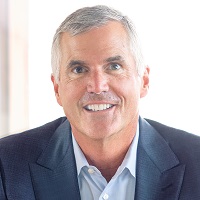Why More Retirees Might Come Out of Retirement
It’s often not solely because of financial reasons, but because of a lack of purpose in retirement. This financial expert can relate.


With ongoing inflation, high interest rates and volatility continuing to impact the market, it isn’t hard to see why Americans are increasingly concerned about outliving their nest egg. As a result, many are rethinking their retirement.
According to a recent survey from F&G, half (50%) of pre-retired and retired Americans are considering delaying or coming out of retirement. Financial factors are certainly a reason, with 52% of pre-retirees worried they won’t have enough money in retirement, and 42% of retirees worried about inflation. But money doesn’t tell the whole story, as the report also revealed that many Americans are returning to work for non-financial reasons — something that I can relate to as well.
Retirement is more than financial independence
Conventional wisdom may say someone would never return to work after retiring unless they were financially forced to, but the reality is many Americans are considering going back to work simply because it makes them feel good. In fact, 50% of retirees are considering “unretiring” because they enjoy the intellectual challenge/stimulation from working, and 36% feel a lack of purpose in retirement.

Sign up for Kiplinger’s Free E-Newsletters
Profit and prosper with the best of expert advice on investing, taxes, retirement, personal finance and more - straight to your e-mail.
Profit and prosper with the best of expert advice - straight to your e-mail.
These responses resonated with me. I was briefly retired, then made the decision to return to the workforce for non-monetary reasons, which is how I eventually took on a new challenge at F&G. The report shows more Americans are having the same feelings I had. Earlier in my career, when I thought of retirement, I saw it as synonymous with achieving financial freedom. That was more important to me than the general idea of “stopping work.” I've always enjoyed working and being a part of a team, but with retirement I was excited about having more control over my life and spending more of my time on the things I wanted to pursue.
When I initially retired, I loved having freedom over my day, but this feeling was short-lived. After a while, I noticed myself missing the camaraderie of the workplace. Growing up, I played a lot of team sports, and I didn't appreciate how work had become my “adult team sport” later in life. Ultimately, that feeling of missing something persisted until I made the decision to “unretire” and get back to working again.
The new idea of retirement and how to get there
Just as hybrid work has emerged over the last few years, we’re seeing “hybrid retirement” become more common. Many folks are realizing that the old vision of retirement as working one day, then being completely retired the next is no longer an attractive prospect. Generations are also now wired differently, and people are approaching retirement differently than their parents or grandparents. They want to learn, achieve goals and spend time with other people who share similar passions. So how can they ensure that happens?
Looking back, the best retirement planning advice I received was 1) plan for it in advance, envisioning what your daily life will look like, and 2) don’t overcommit yourself in the first year of retirement.
It’s important to financially plan for retirement, but people approaching retirement also need to plan for their life goals. It’s critical to carefully think through what you'd like retirement to look like. Do you want to travel? Spend more time with family, such as your grandkids? Volunteer? For people in a relationship, especially, it’s easy to make assumptions that can lead to disappointment, so aligning on a common vision is a critical first step. Once someone can identify what will inspire and bring them purpose in retirement, they can make a plan to ensure they are working to achieve it.
Experts can help
One of the best ways people can ensure they are well positioned to achieve the retirement they want, both financially and non-financially, is to speak with a financial adviser or similar professional.
Surprisingly, the survey found that half (50%) of pre-retirees and retirees don’t currently work with a financial adviser. This is a huge missed opportunity for people to get input about their retirement plan and goals. Speaking with an adviser can alleviate concerns around inflation and outliving savings and ensure individuals have the right products to meet their needs. For example, retirees and pre-retirees may want to consider options such as annuities, which can provide peace of mind and guaranteed income for life regardless of what happens in financial markets. For financial advisers, it’s also a chance to look beyond just the portfolio and lean into the role of “life coach” to help clients plan for overall happiness as well.
Ultimately, Americans’ retirement views are changing and moving beyond just financial concerns. Everyone’s life situation, goals and “dream retirement” are different, so there’s no one formula based on age or when or how to retire. For example, for Baby Boomers considering pushing back their retirement, the top reason they are doing so is because they enjoy the intellectual challenge/stimulation from working (51%), whereas for Gen Xers the top reason is tied between being worried about inflation (45%) and wanting more financial options and a larger safety net (45%).
Spending time today reviewing your concerns, understanding your goals and building a plan to get there can pay off for years to come. Once people have that added direction, they won’t have to worry about feeling like they are missing something in retirement. Instead, they’ll enter that next chapter more financially secure and personally fulfilled.
Note: The F&G survey was conducted online by Directions Research and fielded from June 7 to June 16, 2023, among a nationally representative sample of 2,015 U.S. adults 18 years of age and older. Respondents were targeted to Americans Aged 50+, who are financial decision-makers and have $100K+ in financial products/savings.
Related Content

For more than 30 years, Chris Blunt has held senior leadership positions at several major insurance and financial services companies. He joined F&G in 2019 and currently serves as the Chief Executive Officer. Prior to that, he served as Chief Executive Officer at Blackstone Insurance Solutions and spent nearly 13 years at New York Life in a variety of executive roles.
-
 Charitable Remainder Trust: The Stretch IRA Alternative
Charitable Remainder Trust: The Stretch IRA AlternativeThe SECURE Act killed the stretch IRA, but a properly constructed charitable remainder trust can deliver similar benefits, with some caveats.
By Brandon Mather, CFP®, CEPA, ChFEBC® Published
-
 Three Ways to Take Control of Your Money During Financial Literacy Month
Three Ways to Take Control of Your Money During Financial Literacy MonthBudgeting, building an emergency fund and taking advantage of a multitude of workplace benefits can get you on track and keep you there.
By Craig Rubino Published
-
 Charitable Remainder Trust: The Stretch IRA Alternative
Charitable Remainder Trust: The Stretch IRA AlternativeThe SECURE Act killed the stretch IRA, but a properly constructed charitable remainder trust can deliver similar benefits, with some caveats.
By Brandon Mather, CFP®, CEPA, ChFEBC® Published
-
 Three Ways to Take Control of Your Money During Financial Literacy Month
Three Ways to Take Control of Your Money During Financial Literacy MonthBudgeting, building an emergency fund and taking advantage of a multitude of workplace benefits can get you on track and keep you there.
By Craig Rubino Published
-
 How Did O.J. Simpson Avoid Paying the Brown and Goldman Families?
How Did O.J. Simpson Avoid Paying the Brown and Goldman Families?And now that he’s died, will the families of Nicole Brown Simpson and Ron Goldman be able to collect on the 1997 civil judgment?
By John M. Goralka Published
-
 What Not to Do if an Employee or Loved One Is Kidnapped
What Not to Do if an Employee or Loved One Is KidnappedBusinesses need to have a crisis plan in place so that everyone knows what to do and how to do it. Sometimes, calling the authorities isn’t recommended.
By H. Dennis Beaver, Esq. Published
-
 Why You Shouldn’t Let High Interest Rates Seduce You
Why You Shouldn’t Let High Interest Rates Seduce YouWhile increased interest rates are improving the returns on high-yield savings accounts, that may not be an effective place to park your money for the long term.
By Kelly LaVigne, J.D. Published
-
 Need to Build an Emergency Fund? Seven Steps to Get There
Need to Build an Emergency Fund? Seven Steps to Get ThereHaving a safety net can mean peace of mind on top of being able to maintain your lifestyle if a financial emergency strikes.
By Justin Stivers, Esq. Published
-
 Which Type of Life Insurance Is Right for You?
Which Type of Life Insurance Is Right for You?Life insurance isn’t a one-size-fits-all option. Here are the differences between term life, whole life and indexed universal life insurance.
By Jay Dorso Published
-
 What Happens Financially When You Work One More Year?
What Happens Financially When You Work One More Year?The impact of saving more, spending less later and benefiting from an extra year or more of compounding can be truly staggering.
By Andrew Rosen, CFP®, CEP Published